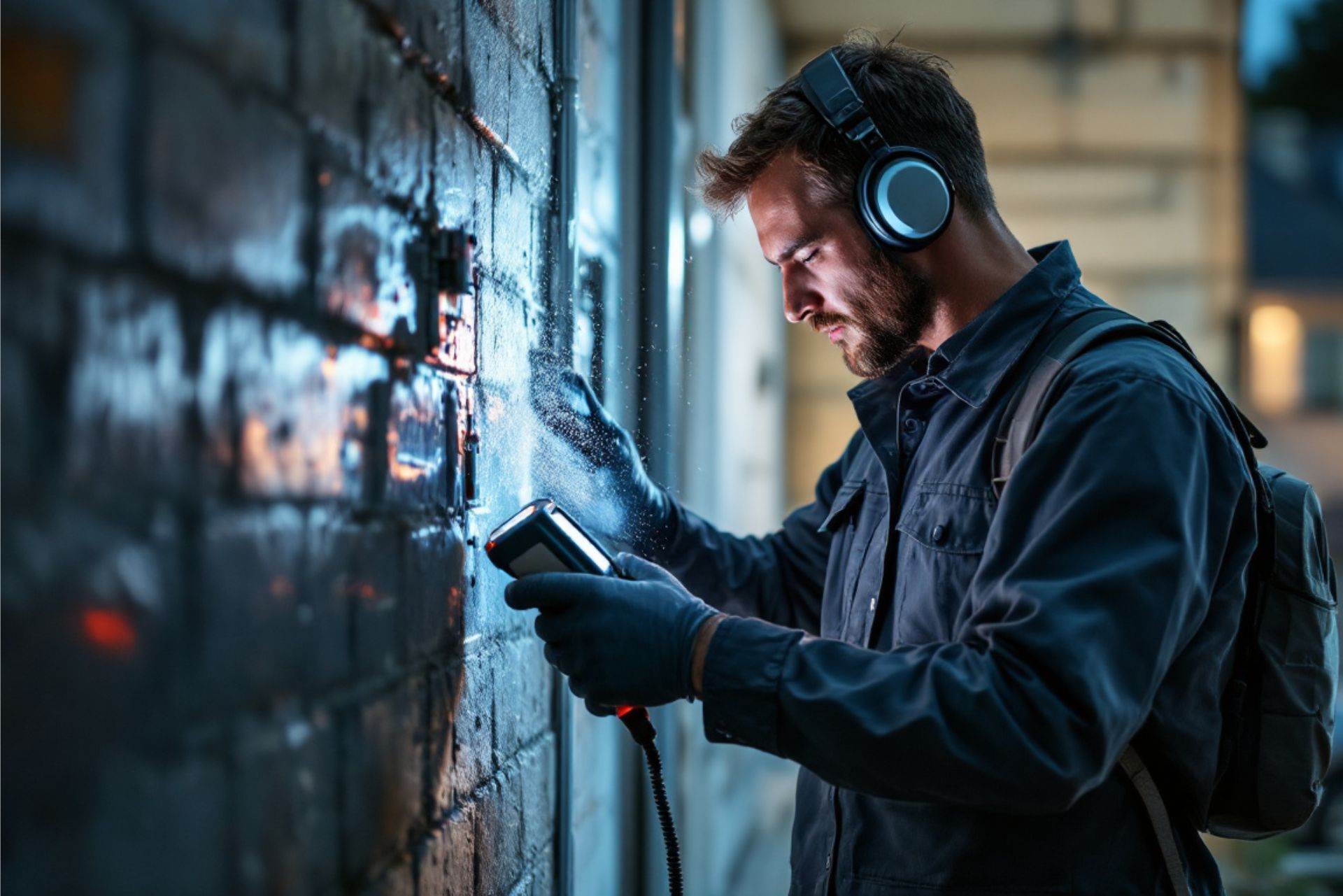Index
Contact Us
Phone
Location
Simi Valley, CA 93065
The Woodlands, TX 77382
Katy, TX 77494
In the modern world, where infrastructure and water management are crucial, leak detection specialists play a vital role in maintaining the integrity of buildings and utilities. However, like any profession, there are risks involved. This is where leak detection specialist insurance comes into play. Understanding the nuances of this insurance is essential for professionals in the field. This article delves into the various aspects of leak detection specialist insurance, ensuring that you are well-informed and prepared.
Understanding Leak Detection Specialist Insurance
Leak detection specialist insurance is designed to protect professionals who specialize in identifying and repairing leaks in various systems, including plumbing, HVAC, and irrigation. This type of insurance typically covers a range of liabilities that may arise during the course of their work.
What Does Leak Detection Specialist Insurance Cover?
Leak detection specialist insurance usually encompasses several key areas of coverage. These may include general liability, professional liability, and equipment coverage. Each of these components plays a crucial role in safeguarding the business and its assets.
General liability insurance protects against third-party claims for bodily injury or property damage. For instance, if a leak detection specialist accidentally damages a client's property while conducting an inspection, this insurance can cover the costs associated with repairs. Additionally, it can also provide coverage for incidents that occur off-site, such as damaging a neighboring property while performing outdoor leak detection work.
Professional liability insurance, on the other hand, covers claims related to negligence or errors in the services provided. If a client believes that a leak detection specialist failed to identify a significant leak, leading to substantial damages, this insurance can help cover legal fees and settlements. This type of coverage is particularly vital in a field where precision is paramount, as even a minor oversight can lead to significant financial implications for both the specialist and the client.
Why is Insurance Important for Leak Detection Specialists?
Insurance is not just a legal requirement; it is a safety net that provides peace of mind. For leak detection specialists, having adequate insurance means they can focus on their work without the constant worry of potential financial repercussions from unforeseen incidents. This peace of mind allows them to concentrate on delivering high-quality services, which in turn can lead to greater customer satisfaction and repeat business.
Moreover, many clients require proof of insurance before hiring a leak detection specialist. This requirement is particularly common in commercial contracts, where the stakes are higher. Having the right insurance can enhance credibility and increase the likelihood of securing contracts. Furthermore, being insured can also open doors to larger projects and collaborations with other contractors, as it demonstrates a commitment to professionalism and risk management. In a competitive market, this can be a significant advantage, allowing specialists to differentiate themselves from those who may not prioritize such protections.
Types of Insurance Policies for Leak Detection Specialists
There are various types of insurance policies that leak detection specialists may consider. Each type serves a specific purpose and can be tailored to meet the unique needs of the business.
General Liability Insurance
General liability insurance is often the foundation of any business insurance plan. For leak detection specialists, it covers claims arising from accidents that occur during their work. This can include slip-and-fall incidents at a client's property or damage caused to the property during leak detection activities.
Having general liability insurance not only protects the specialist but also builds trust with clients. It demonstrates a commitment to professionalism and responsibility, which can be a deciding factor for potential customers. Additionally, many clients may require proof of this insurance before allowing specialists onto their premises, making it a crucial component of business operations in the leak detection industry.
Professional Liability Insurance
Professional liability insurance, also known as errors and omissions insurance, is critical for leak detection specialists. This coverage is essential for protecting against claims of negligence, misrepresentation, or failure to deliver promised services.
For example, if a leak detection specialist fails to identify a significant leak that results in extensive property damage, the client may seek compensation. Professional liability insurance can help cover the costs associated with legal defense and any settlements that may arise from such claims. Furthermore, this type of insurance can provide peace of mind to specialists, allowing them to focus on their work without the constant worry of potential legal repercussions from dissatisfied clients.
Equipment Insurance
Leak detection specialists rely heavily on specialized equipment to perform their jobs effectively. Equipment insurance protects against damage, theft, or loss of these tools. This coverage is particularly important for businesses that invest significantly in high-tech leak detection tools.
In the event of equipment failure or loss, having this insurance ensures that specialists can quickly replace or repair their tools, minimizing downtime and maintaining service quality. Moreover, many leak detection tools, such as acoustic listening devices and thermal imaging cameras, can be quite expensive. Therefore, having equipment insurance not only safeguards the investment but also helps maintain a competitive edge in the market by ensuring that specialists are always equipped with the latest technology to provide efficient and accurate services.
Workers' Compensation Insurance
For leak detection specialists who employ others, workers' compensation insurance is a vital policy. This insurance provides coverage for medical expenses and lost wages for employees who may be injured while on the job. Given the nature of leak detection work, which can involve crawling under homes or working in potentially hazardous environments, the risk of injury is ever-present.
By having workers' compensation insurance, specialists can protect their business from lawsuits related to workplace injuries and ensure that their employees receive the necessary care and support in the event of an accident. This not only fosters a safer working environment but also enhances employee morale, as workers feel valued and protected by their employer. Additionally, in many jurisdictions, having this insurance is a legal requirement, making it an essential consideration for any leak detection business that employs staff.

Factors Influencing Insurance Costs
The cost of leak detection specialist insurance can vary widely based on several factors. Understanding these factors can help specialists make informed decisions when selecting their insurance policies.
Business Size and Revenue
The size of the business and its annual revenue are significant factors that influence insurance costs. Larger businesses with higher revenues may face higher premiums due to the increased risk associated with larger operations.
Conversely, smaller businesses or sole proprietors may benefit from lower premiums. However, it is essential to ensure that the coverage is adequate for the specific risks associated with their operations. For instance, a small leak detection business operating in a niche market may find that while their premiums are lower, they also need to be vigilant about the specific liabilities they face, such as equipment failure or customer disputes, which could lead to costly claims if not properly insured.
Location and Market Conditions
The geographical location of the business also plays a crucial role in determining insurance costs. Areas with higher rates of natural disasters, such as floods or earthquakes, may see increased premiums due to the elevated risk of property damage.
Additionally, the local market conditions can influence costs. In regions where leak detection services are in high demand, insurance providers may adjust their rates accordingly. For instance, urban areas with a high concentration of commercial properties may present more opportunities but also more competition, which can drive up costs. Conversely, in rural areas, while the competition may be less fierce, the potential for large-scale projects might be limited, affecting the overall risk assessment by insurers.
Claims History
A business's claims history is another critical factor that insurers consider. Companies with a history of frequent claims may face higher premiums, as they are perceived as higher risk. On the other hand, a clean claims history can lead to lower rates and potential discounts.
Moreover, the nature of past claims can also impact future premiums. For example, if a leak detection specialist has previously filed claims related to equipment damage, insurers may view this as an indication of inadequate maintenance practices, prompting them to raise premiums. Conversely, a business that has invested in employee training and robust operational protocols may demonstrate lower risk, which can be beneficial when negotiating insurance terms. This highlights the importance of not only maintaining a clean claims record but also actively managing risk through preventive measures and ongoing education in the field.
Finding the Right Insurance Provider
Choosing the right insurance provider is a crucial step for leak detection specialists. With numerous options available, it is essential to conduct thorough research to find a provider that meets specific needs. The right insurance not only safeguards your business but also enhances your credibility with clients, as it demonstrates a commitment to professionalism and risk management.
Assessing Coverage Options
When evaluating insurance providers, it is vital to assess the coverage options they offer. Not all policies are created equal, and some may provide more comprehensive coverage than others. Specialists should look for policies that specifically cater to their industry and address the unique risks they face. For instance, coverage for equipment damage, liability for property damage, and protection against environmental hazards are critical components that should not be overlooked.
Additionally, understanding the exclusions and limitations of each policy is crucial. This knowledge can prevent unpleasant surprises when filing a claim. It may also be beneficial to inquire about additional endorsements or riders that can be added to a policy for enhanced protection, ensuring that all potential risks are adequately covered.
Reading Reviews and Testimonials
Reviews and testimonials from other leak detection specialists can provide valuable insights into an insurance provider's reputation and customer service. Online forums, industry associations, and social media platforms can be excellent resources for gathering feedback. Engaging with peers in the industry can also yield personal anecdotes that highlight the strengths and weaknesses of various providers.
Choosing a provider with a strong track record of customer satisfaction can make a significant difference in the claims process and overall experience. It’s also wise to look for providers that offer dedicated support and guidance during the claims process, as this can alleviate stress and streamline resolution when issues arise.
Comparing Quotes
Obtaining quotes from multiple insurance providers is an essential step in finding the best coverage at the most competitive price. Specialists should take the time to compare not only the costs but also the coverage limits and deductibles associated with each policy. This process may involve asking detailed questions about what each policy covers and how claims are handled, ensuring that you have a clear understanding of what you are purchasing.
While it may be tempting to choose the cheapest option, it is crucial to ensure that the coverage adequately protects against potential risks. A slightly higher premium may be worth it for more comprehensive coverage. Furthermore, consider the financial stability of the insurance provider, as a company with strong financial backing is more likely to fulfill its obligations in the event of a claim.
Common Exclusions in Leak Detection Specialist Insurance
While leak detection specialist insurance provides valuable protection, it is essential to be aware of common exclusions that may apply. Understanding these exclusions can help specialists avoid potential pitfalls.
Pre-Existing Conditions
Many insurance policies include exclusions for pre-existing conditions. This means that if a leak or damage was present before the insurance policy was purchased, it may not be covered. Specialists should ensure they conduct thorough inspections and document existing issues to avoid complications. Regular maintenance checks and detailed reporting can serve as a safeguard against disputes over pre-existing conditions. By maintaining meticulous records, specialists can provide evidence that supports their claims and demonstrates due diligence in their work.
Intentional Acts
Insurance policies typically do not cover damages resulting from intentional acts or misconduct. If a leak detection specialist intentionally damages a client's property or engages in fraudulent activities, the insurance provider will likely deny any claims related to those actions. This exclusion underscores the importance of ethical practices in the industry. Specialists should prioritize transparency and integrity in their dealings, as any hint of misconduct not only jeopardizes their insurance coverage but can also tarnish their professional reputation. Building trust with clients through honest communication and reliable service is essential for long-term success.
Contractual Liability
Some policies may exclude coverage for liabilities assumed under contracts. This means that if a leak detection specialist agrees to take on additional responsibilities or liabilities through a contract, those may not be covered by their insurance. It is essential to read contracts carefully and understand the implications before signing. Specialists should consider consulting with a legal professional to ensure that they fully comprehend the terms and conditions of any agreements they enter into. Additionally, negotiating clear terms that delineate responsibilities can help mitigate risks and protect against unexpected liabilities that could arise from contractual obligations.
Environmental Hazards
Another common exclusion in leak detection specialist insurance pertains to environmental hazards. Many policies do not cover damages related to hazardous materials, such as mold or asbestos, that may be uncovered during leak detection efforts. As environmental regulations become increasingly stringent, specialists must be vigilant in identifying and managing these risks. Implementing safety protocols and training staff on how to handle hazardous situations can not only protect their business from potential liability but also ensure the safety of their clients and employees. Furthermore, specialists may want to consider additional coverage options specifically designed to address environmental risks, providing a more comprehensive safety net for their operations.

Best Practices for Leak Detection Specialists
To minimize risks and ensure the smooth operation of their business, leak detection specialists should adopt best practices that align with their insurance coverage.
Regular Training and Certification
Staying updated with the latest techniques and technologies in leak detection is crucial. Regular training and certification can enhance skills and reduce the likelihood of errors that could lead to claims.
Additionally, many insurance providers may offer discounts for specialists who participate in ongoing education, making it a win-win situation.
Thorough Documentation
Maintaining thorough documentation of all inspections, repairs, and communications with clients is essential. This documentation can serve as valuable evidence in the event of a dispute or claim.
Keeping detailed records helps demonstrate professionalism and can protect against allegations of negligence or failure to deliver services.
Implementing Safety Protocols
Establishing and adhering to safety protocols can significantly reduce the risk of accidents and injuries on the job. This includes using appropriate personal protective equipment (PPE) and ensuring that all employees are trained in safety procedures.
By prioritizing safety, leak detection specialists can minimize the likelihood of claims related to workplace accidents, ultimately benefiting both their business and their insurance premiums.
Conclusion
Leak detection specialist insurance is an essential component of operating a successful leak detection business. By understanding the different types of coverage available, the factors influencing insurance costs, and best practices for risk management, specialists can protect themselves and their clients effectively.
Investing in the right insurance not only safeguards against potential financial losses but also enhances credibility and trust with clients. As the industry continues to evolve, staying informed about insurance options and best practices will be crucial for leak detection specialists looking to thrive in a competitive market.
In conclusion, taking the time to research, compare, and select the appropriate insurance coverage is a critical step for leak detection specialists. With the right protections in place, professionals can focus on their work, confident in the knowledge that they are prepared for whatever challenges may arise.
Types of Plumber Insurance We Provide
Areas we serve




